
Preparing for Tsagaan Sar – New Year / Mogi misbehaves again / Dangerous trip to the toilet
N 51°33'336'' E 099°15'341''
Day: 208
Sunrise:
08:34
Sunset:
18:39
Total kilometers:
1281
Soil condition:
Ice, snow
Temperature – Day (maximum):
minus 15°C
Temperature – day (minimum):
minus 28°C
Temperature – Night:
minus 35°C
Latitude:
51°33’336”
Longitude:
099°15’341”
Maximum height:
1981 m above sea level
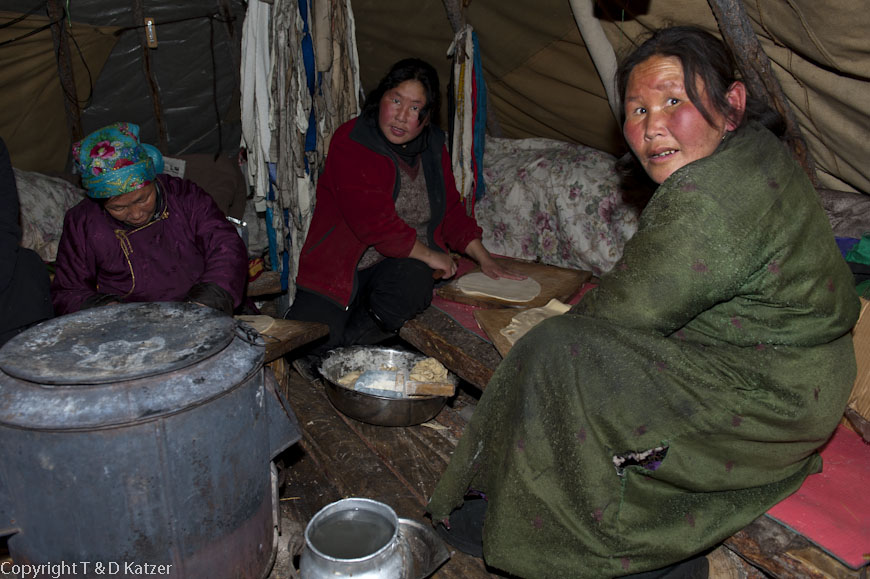
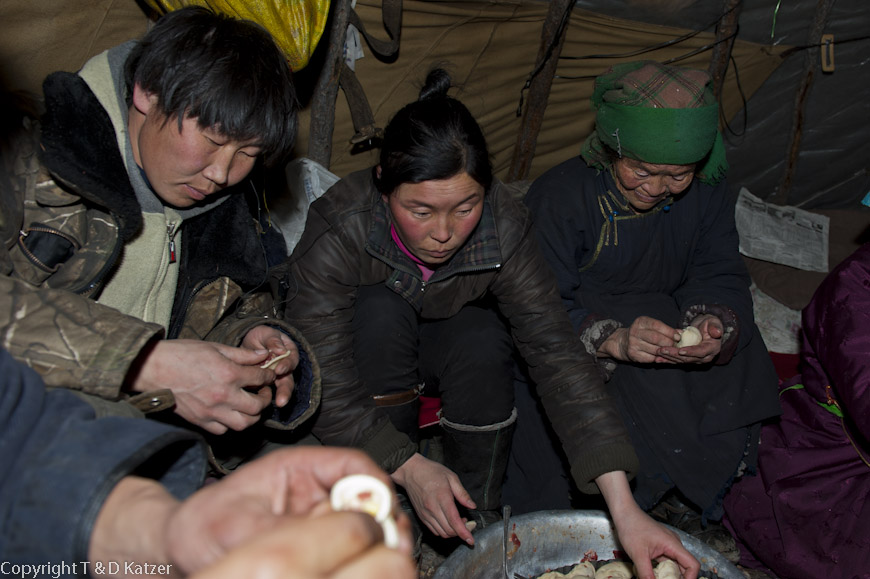
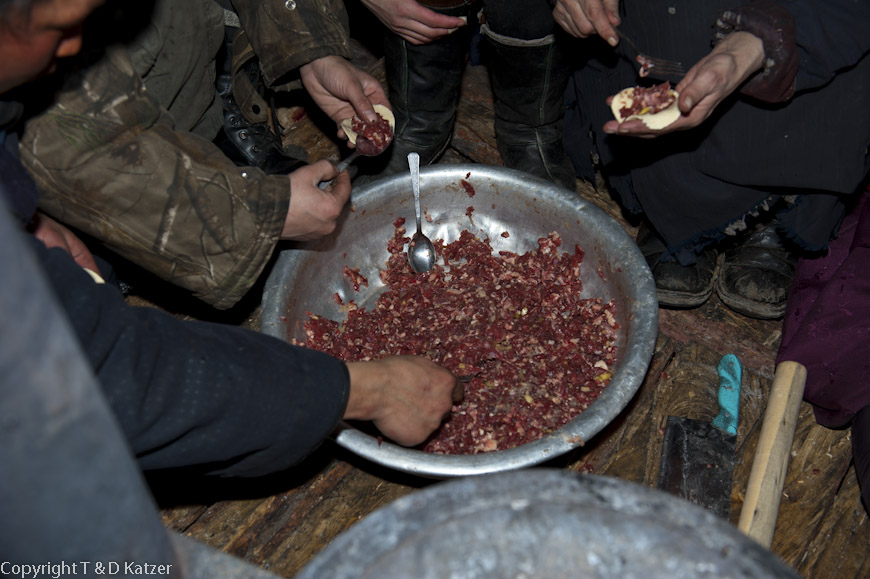
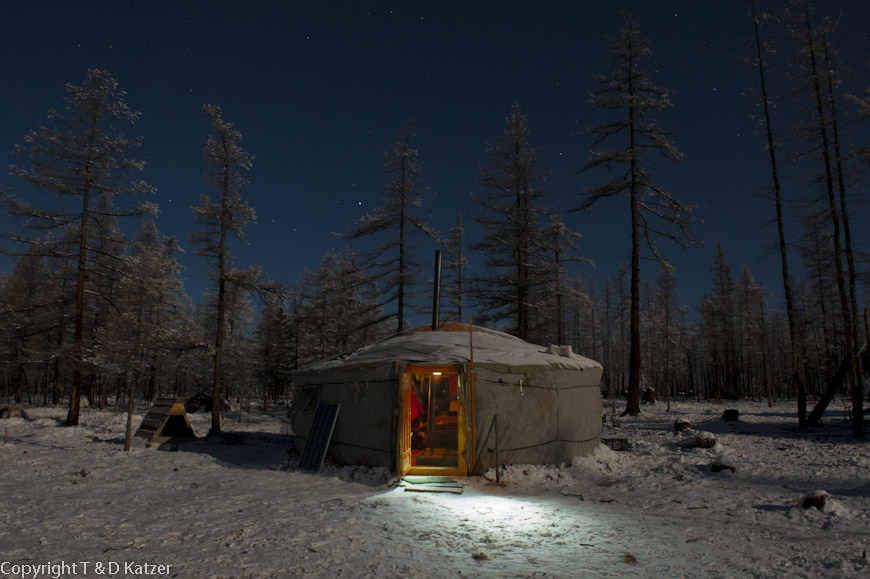
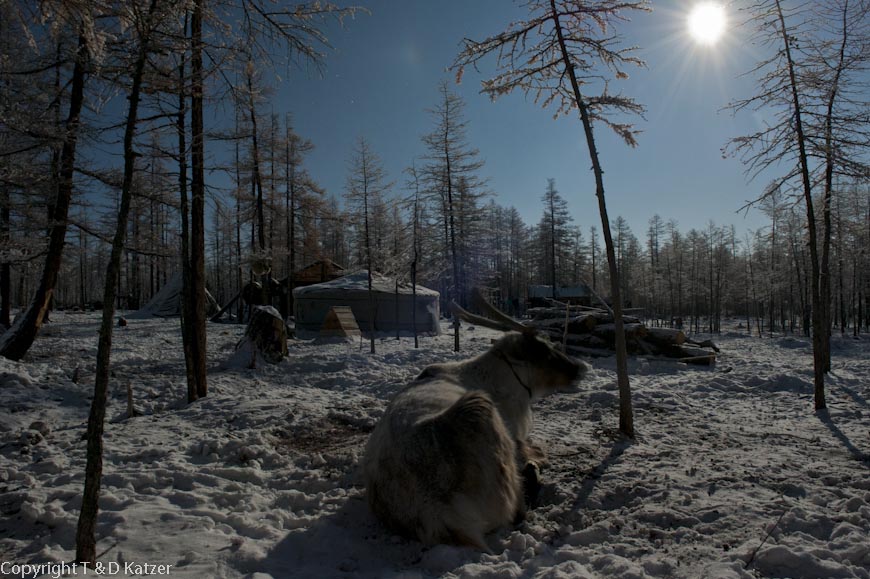
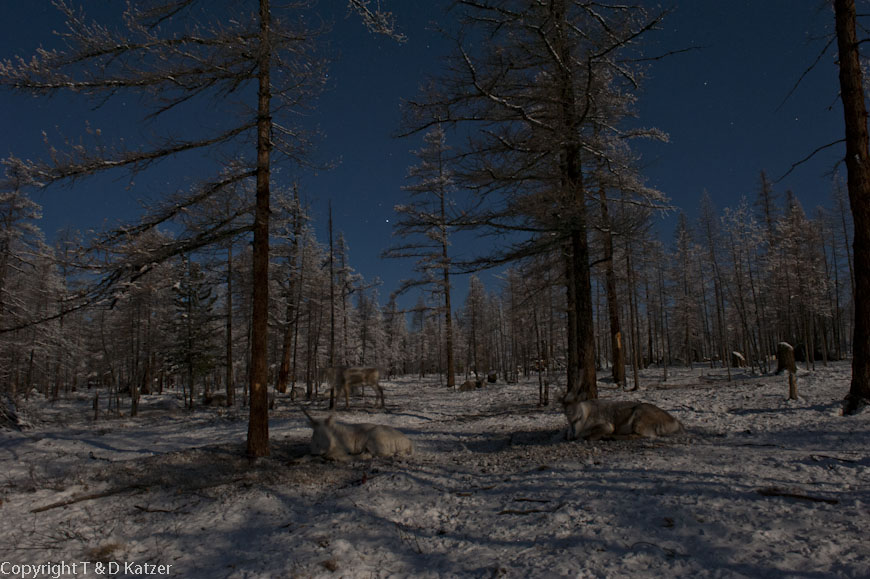
Although the February nights are still bitterly cold with temperatures as low as minus 35 °C, the rivers and lakes are frozen, the steel-blue sky is reflected in sheer layers of ice and a thin blanket of snow covers the country, preparations for the New Year celebrations have been in full swing for days. Although in Mongolia, as in Europe and other countries around the world, the New Year begins and is celebrated on January 1st, the traditional New Year begins with the first month of spring. The exact date is calculated by the lamas according to the lunar calendar and lies between the end of January and mid-March.
The Tuwa women wash their laundry and clean their tipis. The men keep going into the taiga and drag whole tree trunks into the camp to saw them into firewood. The hustle and bustle in our otherwise sleepy camp has visibly increased. Women and men, young and old, sit exuberantly in their tipis to make buuz (dumplings filled with minced meat). Due to their remoteness from villages and settlements, buuz are obviously the perfect festive food. There will also be some sweets such as candies and dry cookies, which will be bought by the family members in Tsagaan Nuur. In normal Mongolian households, on the other hand, mountains of New Year’s bread are piled up, enriched with sour cream, soft cheese, other dairy products and all kinds of sweets. The most important thing, however, is the cooked saddle of mutton with its fat tail. So fat that you can catch the droplets running down with a small container. The animal’s severed head lies somewhere next to the entrance to the yurt, gazing with its empty eyes at the house altar to the north. Out here, in the heart of the taiga, the feast of feasts will be somewhat more modest. However, we have been told that a veritable stream of vodka will be flowing.
“How do you actually translate Tsagaan Sar?” I ask Tsaya. “White moon, but you could also say white month.” “Does that refer to the snow?” I ask. “I’m not so sure about that either. The word white could refer to the white foods such as dairy products that we particularly like to eat during the festive season. But others say that white is the color of purity and happiness. In this case, Tsagaan Sar could also be translated as the happy month. “It must be an old festival that the Mongols have been celebrating for centuries?” “Oh yes. As far as I know, since the 4th century BC.” “Wow, then it’s a really big festival?” “With the Naadam (sports and national festival) the biggest.” “It’s great that we can spend it with you,” I say, not yet knowing what fear and terror this festival will cause us and ask whether the Tuwa and Mongols celebrate Tsagaan Sar differently.
“The contrast lies in our remoteness. In the cities, religious services are held almost continuously during the last five days of the year. The monks recite from the ancient scriptures without interruption for four days. On the evening before the New Year, the lamas begin with a ceremony to honor the deity Tserelcham. He is supposed to bring us luck and prosperity. The following morning, on the first day of the New Year, the mandal ceremony begins, with which the monks address the god Ochirdar, the protector of Mongolia. The Mongols and the Tuwa begin New Year’s Day, which we call “shiniin negen”, with the first rays of sunshine in front of their yurts and tipis to welcome the virgin year with open arms,” explains Tsaya, who is obviously well versed in their customs and the associated rules.
“What do we need to bear in mind for this important celebration?” I ask in order to avoid behavioral errors at an early stage. “Oh, best you follow Ultsan and me. After we have greeted the day, we go to Gamba to show him respect as clan elder. We present him with a blue silk scarf, the khadag and a new banknote.” “A new banknote?” I ask. “Yes, but it doesn’t have to be much. Two hundred or three hundred tugriks is quite enough. It’s symbolic.” “Where are we supposed to get new banknotes from?” I wonder. “It’s not a problem. In the taiga, we don’t take such a close view. At least it shouldn’t be torn or even ripped.” “Well, that’s a relief,” I snort with relief.
“The youngest member of the family will be the first to wish Gamba health and happiness,” Tsaya continues her explanation. “Then the others follow his example, depending on their age. We ask about the welfare of the reindeer, the family and so on. Although we are together every day, we act as if we haven’t seen each other for weeks. That’s the custom. But that’s not all. As we offer our congratulations, we reach under the elder’s arms with our palms facing upwards.” “Why is that?” I ask. “This is to symbolize that the young support the old and that the old can trust the young one hundred percent. In this way, we go from relative to relative or from present to present.” “Hm, I hope we don’t make a mistake,” Tanja interjects. “Oh no. All you have to do is copy us. But I have forgotten one thing. When we pay our respects to our elders as explained, we lean forward. In Europe, you would possibly kiss your counterpart on the cheek. We, on the other hand, audibly draw air through our noses.” “What? That’s strange,” I interject. “No, quite the opposite. That’s our custom. It means we sniff each other.” “Well, it’s strange for us. But other countries, other customs. I’ve often observed sniffing. Mostly with parents who smell their small children,” I say. “Yes, that’s true. But this custom is increasingly being forgotten,” Tsaya replies. “Do you give each other presents?” Tanja interjects. “Oh yes. The visitors give their guests small gifts, which are usually of symbolic value.” “Oh dear. Where are we supposed to get so many presents?” I ponder. “Don’t worry Denis. We still have enough tobacco, tea, perfume samples and other little things. That won’t be a problem,” Tanja reassures me.
“And how long will the celebrations last?” I ask. “In the countryside and especially here in the taiga, it can take many days. The relatives use the time to visit each other. We don’t often have the opportunity to do this in our great country.
Mogi misbehaves again
After almost two months in the Tuwacamp, Mogi has become accustomed to the reindeer, dogs and people. He has even managed to fight his way up to the top of the Taiga dogs. Apart from Gamba’s old one-eyed four-legged friend, no one can challenge his position. So we let him off the chain a little longer every day. Mogi enjoys his regained freedom to the full. As soon as it is off the annoying chain, it makes its rounds through the base and marks one place or another. Nobody seems to be bothered by it anymore. Tanja and I are happy to see him so happy. When I take him for a walk in the forest, he flies over the snow fields like an arrow. Its power seems inexhaustible. Like a chamois, it jumps from snow pile to snow pile or plows a veritable path through the eternal white with its nose in search of mice. It is a real pleasure to watch the exuberant muscle pack.
In the evening, we sit with Tsaya and Ultsan in the log cabin and talk about the upcoming big event. “Imagine what has happened,” says Tsaya as she enters the hut with a bucket full of snow. “Well, what is it?” Tanja and I ask. “Your Mogi was with your friend Suren and ate her buuz,” she laughs at me with a wink. “What did he do?” I ask incredulously. “He ate at least 80 buuz. Suren put them on a tray in front of her tepee to freeze them. She just wanted to quickly get something from her tepee when Mogi took the opportunity to eat it all away.” “Oh no!” exclaims Tanja in horror. “Why is she putting the buuz on the snow? She could have put the dumplings on the high stand. That’s what they’re there for,” I ask. “No idea why she puts her festival buuz on the ground. Probably thought it wouldn’t be a problem if she just went into the tent. But Mogi took the short opportunity,” explains Tsaya. “Man oh man. This dog will soon drive you mad. There are at least 10 dogs in the camp and Mogi is the only one who can gobble up 80 buuz within seconds,” I groan.
Tanja immediately jumps up to bring Suren some of our meat supplies. A little later, she returns to the log cabin. “So, what did Suren say?” I ask curiously. “She didn’t accept our meat. I really tried to convince her but to no avail,” says Tanja. “She was embarrassed. She knows best that dogs in the camp are cunning food thieves. She should never have put the buuz on the ground. It was her own fault. That’s why she didn’t take your meat,” explains Tsaya. “Well, it’s her fault, but as soon as Mogi is off the chain he gets up to mischief. He’s got a real paw for that,” I reply.
When we get back to our yurt, we take Mogi inside with us. I’ve been putting the muzzle on him for a few days now to get him used to it slowly. As always when he gets the thing pulled over his snout, he stands or lies stock-still. “The muzzle seems to be stealing all his spirits,” I say sympathetically. After about 15 minutes I release our dog again and give him a piece of meat as a reward. Then I put some wood in the stove to feed the dying fire. Mogi watches me with interest. I close the oven door as Mogi begs me for more delicacies. “You’ve already had your reward,” I reprimand him. The greedy Mogi doesn’t give up, wags his tail and takes a step back. His tail wagging over the oven door and his hairy butt suddenly catch fire. “Oh no. What a mess!” I shout and extinguish the cock and ass fire with a few handshakes. As it only affected his fur, he didn’t feel anything from his involuntary depilation. “Oh, that smells terrible!” says Tanja. “Sure, burnt hair smells horrible,” I reply, leading the unlucky man outside. “You were lucky. There’s still enough fur on your backside. At least you won’t catch cold in the arctic temperatures,” I say, clicking him in front of his doghouse.
Back in our cozy, warm den, I sit down at the wooden table and pour myself a cup of tea. “Would you like a tin of fish with freshly baked bread for dinner?” asks Tanja. “Oh yes, that sounds delicious”, I reply because our supplies only allow for such a rarity as fish every two weeks. I indulge in the fish marinated in tomato sauce. With a full belly, I crawl onto our wall, groaning. “Denis, if you have to fart, you should go outside,” Tanja admonishes me. “That wasn’t me. Mogi farted,” I fib. “It’s not all the poor guy’s fault. Besides, he’s lying outside in his hut,” Tanja replies with a grin. “His farts are so powerful that they even penetrate the felt wall of the yurt,” I assure him with mock seriousness. “That’s for sure. It must have been Suren’s 80 buuz.” “Yes, Tsaya told me that Suren accidentally mixed far too much of that awful sunflower oil into the mince. It was so much that she had difficulty forming the mixture into dumplings,” I continue to shift the blame onto our greedy four-legged friend. About 15 minutes later, one stomach cramp follows another. All the fun has gone out of my conversation. “I don’t think the fish was good,” I justify myself meekly. “But it tasted completely normal,” wonders Tanja, who had tasted the can. “Nevertheless. Where else would I suddenly get stomach cramps like this?”
Dangerous trip to the toilet
I spend a sleepless, uncomfortable night. I feel sick and my stomach has bulged outwards like a barrel. At 5:00 a.m. I can’t stand it any longer and get up. At minus 14°C in our felt tent, I shiver from the cold, slip into a second pair of long underpants and pull on my down jacket. I hastily jump into my thick felt boots and leave the shelter of our home at this ungodly hour. I rush into the nearby forest as quickly as I can to seek relief from the minus 35°C temperatures. Although I should be used to the temperatures by now, the icy wind almost freezes me. In this moment of suffering, I wish I was in a warm country like India or Sri Lanka. “Fucking cold!” I curse under my breath and put the wet paper, which has frozen hard in seconds and is therefore completely useless, back in my jacket pocket. So as not to leave any traces, I light the half-frozen toilet paper with a match and push snow over the residue. Although this is usually useless as almost all the dogs in the camp eat it. “Some of the poorly fed animals would probably starve to death without these meals,” it goes through my mind. Disgusted, I leave the place. My hands are almost numb and hurt. The frost has now eaten into our limbs. I stumble through the undergrowth to reach the narrow path that leads me to the camp. After a few minutes, I pause, panting. “Where is this damn path?”, it shoots through my head. Suddenly I feel hot for a moment. “I’m not lost, am I?” The realization hits me like a hammer. “Take it easy. Concentrate. Did I leave the path to the left or to the right when I went into the bushes?” I think hard. I am aware that this is of fundamental importance. Having turned left into the thicket, I now have to turn right to find the narrow path through the forest again. But now I’m no longer sure where the right-hand side should be? In the last few minutes, I’ve turned on my own axis too many times to get my bearings. “That’s enough to make you tear your hair out! How can a professional adventurer get lost on the way to the bathroom? That simply can’t happen,” I curse. Despite my down jacket, I start to shiver all over. As I’m only wearing underpants and not dressed for a night hike in the Arctic cold, the minus 35 °C bites me hard in the legs. I think hard and look up at the sky to see if I can at least find the rough direction to the camp by looking at the stars. But when crap happens, it happens properly. Wispy clouds drift across the night sky, making it hard to make out the stars. “Follow your tracks back and reorient yourself,” it goes through my head. I carefully trudge back into the dense forest. Almost in a panic, I notice that the snow is covered in countless reindeer tracks. No chance of following my trail. I turn on my own axis again to catch a glimmer of light from the camp. But at this time of day, there are no candles burning in our yurt and no light coming from the tipis. Sure, people are asleep. Tanja is also still asleep. She hasn’t even noticed my absence and by the time she wakes up I’m frozen to death. Oh man, that simply can’t be true. Now we’ve got this far and then I make a slip-up like this. Sure, my bad stomach ache drove me into the forest and robbed me of my attention. Nevertheless, this is unforgivable. Despite the cold, I follow my instinct and walk slowly and carefully through the snow. I decided to follow this direction for five minutes. If I don’t find a trail, I follow my tracks back to the current starting point and then try again in a different direction. That way I should hit the path. Suddenly my senses are razor-sharp. Below me I discover a vehicle track that has pressed itself into the snow. “This must be the way a four-wheel drive vehicle gets into the base every now and then. Yes, without a doubt, there are more tracks,” I say happily. Excited, I run after them. Just three minutes later, I recognize the distant outline of our yurt in the twilight of the early morning. Relieved, I walk towards it. Arriving at our Mongolian house, I pull open the wooden door covered with thick felt and flee inside. Although it’s still minus 14 °C there, this temperature seems almost real to me. I take off my down jacket, hang it on the hook and slip into my sleeping bag, frozen. “Do we have to get up already?” asks Tanja, half asleep. “No, it’s only 5:30 in the morning,” I reply, breathing into my down jacket to get warm again.
I leave our sleeping quarters at 9:00 a.m. with weak limbs. Tired, I tell Tanja about my morning adventure. “Something like this mustn’t happen,” she admonishes me sympathetically, her eyes widening in shock. “Yes, I know. I just wasn’t paying attention,” I reply. “And how are you feeling now?” “It was a mild case of fish poisoning, no doubt. I still feel sick. But at least my stomach ache is better.” “You’ll be better again tomorrow.” “Definitely, but…” I say and think about letting it go. “But what do you mean?” asks Tanja. “Oh, I don’t know. Somehow the never-ending winter is starting to get to me. I’m longing for spring. For warmth and sunshine,” I say carefully so as not to infect Tanja with my bad mood. “Oh, good that we’re talking about this. I feel the same way.” “Really? You have the same feelings?” “Sure, it’s the longest winter of my life. It’s beautiful in the taiga, but I also long for blooming flowers, the buzzing of insects and the sound of a stream. It’s been winter since October. That’s a whole five months. It’s absolutely normal that we long for the warmer months,” she replies. “Hm, I thought I was suffering from melancholy. But you’re probably right,” I reply thoughtfully and step outside to let Mogi off the chain.
The dog has barely shot through the camp as usual when Ultsan comes to me. “You have to teach Mogi not to pee on log cabins, in tepees, dog kennels, woodpiles and other objects. The inhabitants of the base are complaining more and more about it.” “That’s right, yesterday he pissed on my solar panel,” confirms Tso, who is standing next to Ultsan with a grin. “How are we supposed to break him of that habit?” I ask, a little desperately. “Well, it’s best if you take him for a walk first before you let him run around camp. Then his bladder won’t be so full,” he suggests. “Ultsan, Mogi is a male dog, he’ll always have a spray in his bladder to mark something with his scent. So that won’t work,” I say. “When Gamba’s dog kept pissing against the woodpile, he beat him up and then hung him by the neck in a tree for a long time. After that, he never marked a woodpile again,” the young hunter tells me. I try not to let my horror show and decide to take our dog for a walk in the taiga every day again from now on. That’s not real freedom for him, but it’s better than being hanged.
Shopping for Tsagaan Sar
Tsaya, Ultsan, Purvee, Saintsetseg, Monkoo, Suren, Darima, Hataa, Shagai and the driver set off in a jeep to Tsagaan Nuur to do some shopping for the festival. Tsaya has explained to Tanja how to feed her dog Henbe and the male dog Galgai. You pour three large cups of flour into the wok and stir until a brown roux is formed. It is important that you stir it over a low heat, otherwise it will form coarse lumps. That’s not good for the animals.” “And the dogs only get cooked flour to eat?” Tanja wondered. “Yes, that’s enough to keep them alive. Every now and then I feed them some meat, but that’s the exception. “In the past, our dogs didn’t get anything to eat. They had to look after their own food and hunt,” explained Ultsan, to say how well the Tuwa dogs are doing today.
“As the jeep’s engine howls under the weight of 10 passengers, Tsaya calls through the open window: “And remember to check the door of our log cabin. It must always be closed. Otherwise the camp dogs will abuse it as a place to live!” “Don’t worry about it. We’ll take care of everything,” Tanja replies. Then the forest swallows up the hotter howl of the tortured engine. “It’s crazy, ten people plus luggage in a normal jeep. When I think of the terrible route, it’s going to be one hell of a ride,” I say sympathetically. “It’s a good thing we don’t have to sit in it,” Tanja replies, turns around and heads straight to log cabin number one to check the door. “Are you okay?” I ask. “Yes, yes. The door is closed,” Tanja says reassuringly. “Now there are only seven of us left in the camp. All flown out. It feels good somehow,” I say. “That’s right. The peace and quiet is overwhelming. Simply pleasant,” Tanja agrees.
We look forward to your comments!

